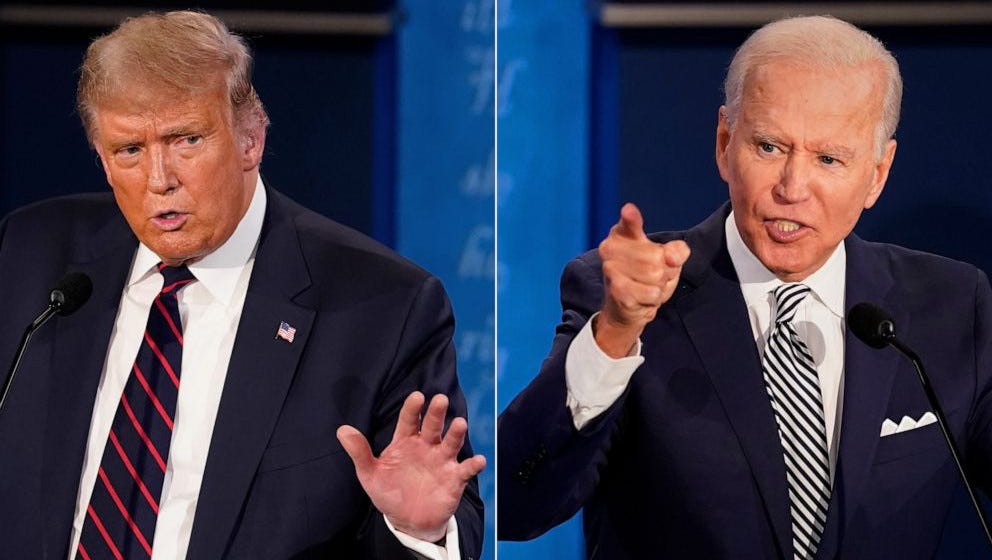EDITORIAL: Debates Are Mostly a Waste of Time
“Winning” the argument says little about who is right
While debates are often touted as platforms for intellectual exchange and truth-seeking, the reality is they often fall short of these lofty ideals. Whether it's the upcoming clash between Joe Biden and Donald Trump or the myriad other contentious debates that saturate our media landscape, the spectacle of debating is typically a contest in rhetoric and performance rather than a useful venue to figure out who’s factually correct.
Presidents Biden and Trump are gearing up for the first of two debates on June 27th with both candidates having something to prove. Biden seeks to assure the public that he’s cognitively up to the job, and Trump wants to swipe back at the person who defeated him in 2020. However, judging from history, these matchups will do little to affect the ultimate result of the election.
Historical precedent and empirical evidence cast doubt on the transformative power of debates. Studies show that debates rarely sway undecided voters or prompt significant shifts in voter preferences1. In part, this is due to the self-selection bias of debate viewers, who are on average more politically engaged and predisposed towards a particular candidate. Consequently, while the Biden/Trump debates may generate excited anticipation, their actual impact on the election outcome is likely to be minimal.
Beyond their limited impact on elections, debates suffer from a fundamental flaw: they prioritize style over substance. Winning a debate often depends far more on charisma, rhetorical skill, and clever one-liners than on the validity of arguments or adherence to facts. This emphasis on performance fosters a culture of soundbites and spectacle, where scoring points becomes the primary objective, rather than facilitating genuine understanding or uncovering truths.
Consider the proposed debate on Joe Rogan’s podcast between Peter Hotez and Robert F. Kennedy Jr. on the efficacy and safety of COVID-19 vaccines. As a doctor and scientist, Hotez is highly qualified to engage in a conversation about vaccines, but he lacks the background that Kennedy has in rhetoric, politics, and persuasion. A conversation on Joe Rogan’s show is not a suitable platform to reach decisions about public health, but people could be tricked into thinking that it is, and even that RFK Jr. is correct because he comes across as more articulate or more comfortable speaking to a general audience.
In the quest for victory, debaters often resort to tactics that undermine the integrity of discourse. It is common to exploit opponents' vulnerabilities for cheap points or even fabricate facts and statistics to catch adversaries off guard. These tactics may generate viral moments and fleeting victories, but they do little to advance understanding or resolve complex issues.
Consider the exchange between progressive commentator Ben Gleib and conservative pundit Charlie Kirk on the issue of abortion. In a viral moment, Gleib showed Kirk a picture of a fetus and asked if it was a human life worthy of rights and protection. Kirk said yes, before Gleib revealed that the picture was of a dolphin fetus, not a human fetus. This was a well-executed gotcha moment, but it did nothing to inform the audience about the circumstances that would lead a woman to choose abortion versus the alternatives, or whether abortion should be legal.
Another example is the debate ostensibly about Christian nationalism between left-wing streamer Steven Kenneth “Destiny” Bonnell II and right-wing provocateur Milo Yiannopoulos. Milo attempted to shame Destiny by bringing up his open relationship with his then-wife Melina to score points with the audience. Destiny, in turn, employed a deceptive tactic, fabricating a statistic about black Americans supporting Christian nationalism to bait Milo. While Destiny's maneuver may have exposed Milo's willingness to run with false information, it underscored a focus on scoring points over meaningful discourse. These instances highlight a troubling trend where debates devolve into spectacles of one-upmanship rather than sincere attempts to grapple with complex issues.
In essence, debates, as they are commonly conceived and conducted, serve more as battlegrounds for ideological warfare than as forums for genuine inquiry and enlightenment. While they may entertain and occasionally enlighten, their ability to foster meaningful dialogue and uncover truths is often overshadowed by their propensity for spectacle and manipulation.
As we navigate a world saturated with debates, and approach the Biden-Trump showdown later this month, it's essential to approach them with a critical eye and tempered expectations. While they may offer glimpses into competing viewpoints, they are typically not a useful tool for arriving at objective truths or facilitating genuine understanding.




Spot on! The problem is not the debate itself, but rather the intended purpose of the debate. However, while presidential debates are somewhat useless, debates in general, when framed correctly, are an effective tool to find common ground. At the beginning of a debate, the goal ought to be "a search for collective truth." We don't engage to "win" or change someone's point of view, but rather to share our own perspective, and listen to those of others with a focus on better understanding the differences among us.
Although I "hear" what you're saying. At least the people that are going to watch it for Trump will be exposed to some truths. They most likely won't believe them, but it will still be out there. In this case, especially, Trump is not going to be showing at his best. He might even go into some of his demensia moments which might confuse them. I think it's worth doing...not to have someone "win" but just to get info out there that the right wing propaganda media is covering up or lying about. Or, for whatever reason, the mainstream media is not reporting, like Biden's accomplishments.